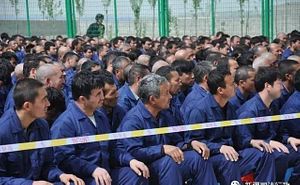Uyghurs struggled for decades to draw attention to the suffering of their people. Chinese authorities have long violated Uyghurs’ cultural, linguistic, and religious rights, marginalizing them in their own homeland. Now they are being rounded up on an unprecedented scale, documented in a new Uyghur Human Rights Project (UHRP) report released yesterday, “The Mass Internment of Uyghurs.” The rapid escalation of repression since 2016 has shocked the world, and tenacious international media coverage has put the issue on the agenda. What remains is for policymakers to act.
Documentation indicates that over 1 million Uyghurs and members of other Muslim ethnic groups have been rounded up into what the government calls “transformation through education centers.” These ethnic internment camps hold more than 10 percent of the Uyghur population in indefinite detention. Another 2 million people, according to estimates, are forced to attend day and evening “study sessions.” More facilities are being built, including a massive underground prison in Karamay.
The evidence for these shocking revelations comes from Chinese government communications, government construction and hiring tenders for the camps, satellite imagery, testimony of family members, and eyewitness accounts from former detainees who have managed to reach safety. Kazakh former detainees who have made it to Kazakhstan describe overcrowded conditions and physical abuse. Detainees are forced to repeat slogans praising Xi Jinping and the Communist Party, to denounce Islam, and to spend hours in Chinese language classes, with threats of further punishment if they do not succeed in speaking and reading it. In the face of this evidence, China was finally forced to respond to international concern last week at the UN, but has only issued absurd denials.
The Chinese government has long seen the Uyghurs as a problem. Above all, Uyghurs have not given up their own language, religion, and culture, despite decades of harsh assimilationist policies. In 2016, the central government installed Chen Quanguo as Party secretary of the Xinjiang Uyghur Autonomous Region. In his previous post in Tibet, Chen had gained a reputation for subduing ethnic discontent by imposing new and harsher methods of control and repression.
In Xinjiang, where Xi Jinping’s Belt and Road Initiative has launched massive investment in new links with Central Asia, Chen has gone much further. The official project of forced assimilation has reached a new extreme, and Uyghurs fear that Beijing wants nothing less than for them to disappear as a people.
The massive roundup of Uyghurs of all walks of life rests on the assumption that every Uyghur is potentially dangerous. Any expression of religious faith, any past travel outside of China, even having relatives abroad, can be used as an excuse to haul away men and women, teenagers and the elderly.
The Uyghur diaspora has become increasingly traumatized as they have lost contact with their relatives – not only parents and siblings, but even aunts, uncles, cousins, and grandchildren. In the past, many Uyghurs living abroad have tried to keep their heads down in order to protect their families. But with Xinjiang police tracking down everyone who has relatives abroad, keeping quiet doesn’t help, and Uyghurs in free countries are now speaking out.
The international community cannot continue business as usual. China’s repression of the Uyghurs is not only a serious human rights emergency, but a clear warning about how the Chinese state chooses to wield power. Locking up hundreds of thousands of people indefinitely in indoctrination camps, and then trying to cover it up, demonstrates that the Chinese government has no intention of moving toward basic rule of law. The complicity of Chinese companies like Huawei and Hikvision in equipping the police state in Xinjiang should make foreign governments and companies recoil from doing business with them.
China accuses democratic countries of using the Uyghurs to try to “destabilize” China and thwart its rise. According to the Chinese government, Western nations harbor “anti-China forces,” and their media is slandering China “out of ulterior motives.” If China’s leaders believe that Western countries are bent on destroying China, why do they do business with them? Can other countries, for their part, trust such a government?
If the evidence of the ethnic concentration camps were a fabrication, China could open the region for journalists and international organizations to visit the supposedly benign “re-education” camps. It could reveal the whereabouts of prominent Uyghurs who have disappeared, including scholars, business leaders, and other well-known figures, along with their families, and allow them to leave the country if they wish.
But nobody expects the Chinese government to do this. On the contrary, experts on the region are concerned that current policies may be only one step in a continuing escalation of repression, and that much graver atrocities, even mass murder, cannot be ruled out. Now is the time to ensure that the Uyghurs’ suffering does not become even worse, and to put into practice what all people of conscience mean when they say “Never Again.”
Omer Kanat is the Director of the Uyghur Human Rights Project and a former journalist for Radio Free Asia.































